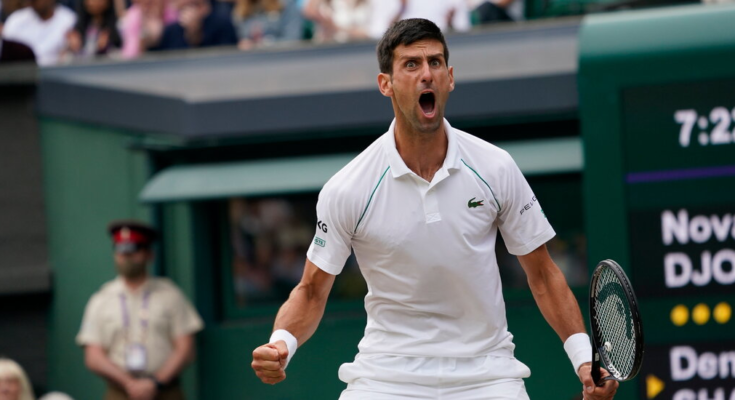WIMBLEDON, England — The theme of the endgame at this year’s Wimbledon men’s tournament is Novak Djokovic against the newcomers.
After holding off the inspired Canadian 22-year-old Denis Shapovalov in the semifinals on Friday, he will face the powerful Italian 25-year-old Matteo Berrettini in the final on Sunday.
Djokovic has dropped just one set in the tournament, and that was the first one he played against the British wild card Jack Draper on opening day when the grass was still lush along the baseline.
But it has turned to dust at this stage along with his opponents’ hopes of pulling an upset. After beating Shapovalov 7-6 (3), 7-5, 7-5, Djokovic can continue to dream big as he chases two great tennis achievements.
Defeat Berrettini on Sunday and he will join his longtime rivals Roger Federer and Rafael Nadal with 20 Grand Slam singles titles, which is the men’s record.
Defeat Berrettini, and Djokovic also will remain on track for the so-called Golden Slam, which requires a player to win all four Grand Slam tournaments and the Olympic gold medal in the same calendar year.
“I’ve been very privileged to make the history of the sport I truly love, and it fills my heart every time I hear there is something on the line that is historic,” he said in his post-match interview. “Obviously it inspires me and motivates me, but at the same time I have to balance it with being present and in the moment.”
At 34, he has certainly had ample experience on the game’s biggest stages. This will be his 30th Grand Slam singles final.
It will be the first for the seventh seeded Berrettini, who defeated the No. 14 seed, Hubert Hurkacz of Poland, 6-3, 6-0, 6-7(3), 6-4 in Friday’s opening semifinal.
Berrettini is the first Italian, man or woman, to reach a Wimbledon singles final.
“I think I never dreamed about this, because it was too much for a dream,” Berrettini said.
He was surely talking about his childhood, not his more recent past, because this run to the final could not have come as a complete shock in light of his results lately.
Last month, he reached the quarterfinals of the French Open, pushing Djokovic, the eventual champion, hard in a tense four-set match. Berrettini then won the grass court warm-up event at Queen’s Club that has often been a harbinger of success at Wimbledon.
At 6-foot-5, he has a powerful serve and one of the heaviest forehands in a sport that is full of heavy forehands. But as he demonstrated against Hurkacz, he has improved his mobility and backhand, both his blocked, two-handed service return and his one-handed slice.
Hurkacz, an aggressive player with a game well-suited to grass, had upset the No. 2 seed, Daniil Medvedev, in the fourth round and Federer in the quarterfinals, winning the final set 6-0 against the eight-time Wimbledon champion.
Berrettini won the second set by the same score on Friday, and though Hurkacz did lift his game and push the semifinal into a fourth set, he could never find a way to break Berrettini’s serve.
But Berrettini, who struck 22 aces, is not just a server. He finished with 60 winners and 18 unforced errors, a remarkable and intimidating ratio.
“Matteo played pretty great,” Hurkacz said. “I mean, he served bombs. He really didn’t do many mistakes throughout the whole four sets. I mean, if he continues to play like this, he has really a big chance in the final.”
The problem for so long has been continuing to play like this against Djokovic, the game’s supreme big-point, big-match player.
Djokovic bends like no one else, contorting his angular frame into positions worthy of Cirque du Soleil. On Friday, he continued to struggle with his footing, as he has throughout the tournament, falling repeatedly. By the end, his white shirt covered in dirt, he looked like someone who had just come out of the backyard after roughhousing with his two young children.
But finishing Djokovic off is one of the toughest tasks in sports. Shapovalov was the latest to take his swings at it. The Canadian left-hander is one of the flashiest players in tennis, and he came out ripping first serves and airborne groundstrokes, forcing even Djokovic out of his defensive comfort zones.
But Djokovic is never more dangerous than when he is cornered, and his well-earned reputation preys on the minds of his rivals. Shapovalov, in his first Grand Slam semifinal, served for the opening set at 5-4 and faltered, missing a forehand long at 30-30 after playing brilliantly to open up the court.
Djokovic went on to break his serve and take command of the tiebreaker as Shapovalov failed to win on the points that he served and finished it with a double fault.
It was a reminder of the past. Djokovic dominated the tiebreakers during his five-set victory over Federer in the 2019 Wimbledon final on this same court. It was also a sign of things to come, as Shapovalov continued to impress with his easy power and stylish game but continued to fail to win the points that mattered most.
He converted just 1 of 11 break points, and though Shapovalov did a fine job of keeping his emotions in check for most of the match, by the final stages he was berating himself after mistakes and shouting into the persistent gloom on this overcast afternoon.
Djokovic can do that to a man, even a very talented one, as he bends but refuses to crack. And though Shapovalov received a loud ovation from the Centre Court crowd after the match, he was also in tears as he headed for the exit.


